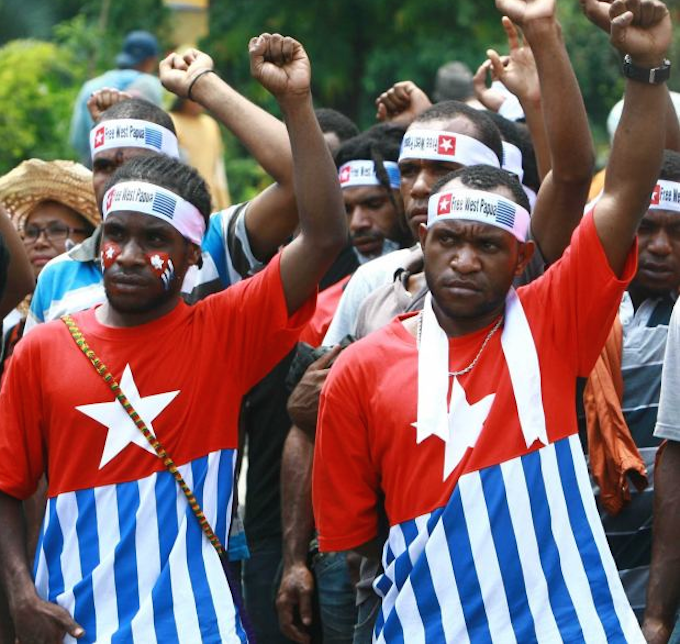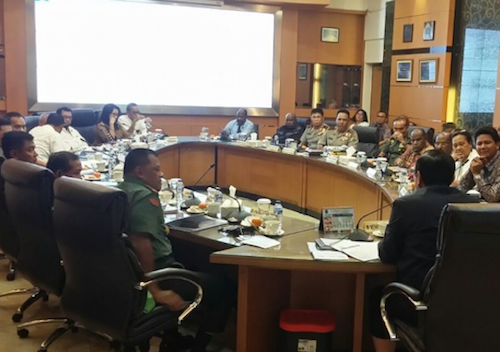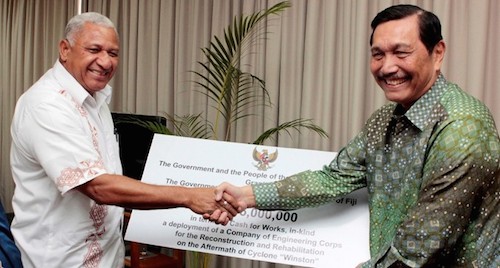
OPINION: By Rev Dr Benny Giay in Jayapura
A number of recent developments in Papua, Indonesia and in the Pacific, have led me to a profound realisation that over the past five decades, we, Papuan people, have not moved from our position in relations with Indonesia.
Our journey to get out of domination and oppressive violence towards our own future with dignity remains confronted with challenges and constraints, as seen in the events that we are recently witnessing.

First, as a reactionary response to the demands of the people of Papua as well as the decision (and possibly pressure) from the Melanesian Spearhead Group (MSG) to send a fact-finding-mission through the Pacific Islands Forum, the Indonesian government has held two focus group discussions (FGD) at a luxury hotel in Jayapura for the so-called “settlement of human rights issues”.
The FGDs were sponsored by Indonesia’s coordinating Minister of Economy, Politics, Law and Human Rights Luhut Binsar Pandjaitan, who once made a humiliating remark to the Papuans by saying: “Just go to Melanesia. No need to stay in Indonesia anymore.”
The statement by a former Kopassus (Indonesian special forces) general was aimed at the United Liberation Movement for West Papua (ULMWP), an organisation that represents our struggle and aspiration.
His tone reminds us of the statement of General Ali Murtopo in 1969: “If the Papuans want independence, ask Americans to find an island in the moon for them to live there.”
A second development that coincided with the FGD is a series of peaceful demonstrations held by the Papuans in West Papua and Indonesia to support ULMWP’s bid for a full membership at the MSG.
2000 detained
Around 2000 activists were detained in a peacefull rally facilitated by the National Committee of West Papua (Komite Nasional Papua Barat, KNPB) on 2 May 2016. This wsas the largest arrest in our history and proves that the Indonesian authorities continue using old tactics of repression: arrests, beatings, and terror against the demonstrators.
Thirdly, the Indonesian government is aggressively lobbying countries and political leaders in the Pacific following the increasing concern and solidarity from the Pacific region and support from the MSG for a resolution of West Papua’s problem.

General Pandjaitan has repeatedly claimed that he has secured Fiji and Papua New Guinea’s support for Indonesia. On the other hand, Pandjaitan contended that foreigners should not interfere in the affairs of human rights in West Papua.
Fourth, without listening to criticism of hazardous development in West Papua, Jakarta, intensifies a development model that puts Papuans simply as objects, without allowing us to become subjects of our own future.
What does all of this mean for Papuan people?
We, the nation of West Papua might be unlucky. The sun has so far stopped shining in the land of our fathers. Since the early 1960s, our land has been made a site of systemic oppression.
But we do not stay silent. We make ourselves subjects of our own history, maintain our dignity and keep fighting. We use a variety of tactics: through a guerrilla struggle (OPM, the Free Papuan Movement), a messianic movement, human rights discourses and NGOs, media, Arnold Ap and his cultural movement, mass urban-based movements such as of KNPB, churches with their critical voices, and so forth.
Many have fled
Apart from the struggles in our own land, some of us have to flee. In the 1960s, a wave of refugees fled to the Netherlands.
Melanesian countries in the Pacific have also became destinations of West Papuan refugees from the 1960s until the 1990s.
Political activists seek political protection in Papua New Guinea, Vanuatu, Australia, Europe, and so forth. In 1969 alone, about 3000 Papuans fled to PNG. Osborne (2001) and Smith (1988) estimate that between 1500-3000 Papuans crossed into PNG and other countries in 1977-1978.
Our history can be written as a history of a fleeing nation. A nation that is oppressed and expelled from our own country, a nation that is walking toward a promised land.
Our journey is stained by stories of those who died and drowned on the way to reach Vanimo, stories of those who walked day and night to reach the land of freedom.
We would like to thank our Melanesian brothers and sisters in the Pacific who are never tired of showing us their unwavering support and solidarity. We thank church leaders, including the Catholic Bishop of Vanimo, Vanuatu, and the Solomon Islands and civil societies in these countries.
The Catholic Bishop of Vanimo granted his land to accommodate members of our congregation because in our own land churches have failed to defend the scattering God’s flocks.
Thanks to Vanuatu, Solomon Islands
We express our thanks to the Vanuatu government that has been trying to unite our leadership from different factions within the struggle. We thank the Prime Minister of the Solomon Islands who offered to mediate an authentic dialogue between ULMWP and the Indonesian government.
We are grateful to the leadership of MSG who has been accepting us in the Melanesian brotherhood.
But we also apologise. We apologise for the inconvenience caused by the presence of our people in the Pacific. We apologise for our helplessness that forced our brothers and sisters in the Pacific to carry our burden and stand in solidarity with us.
We apologise that the burden of our struggle has become a burden of our Melanesian brothers and sisters. We apologise that our struggle changes the political dynamics of Melanesian nations, forcing Melanesian nations to confront each other.
I believe that all of this is not an accident of history. Indeed, West Papua is a product of history that is blind to our suffering and God who remains silent on the fate of Papuans.
We tip our hats and thank chiefs, church leaders, media, political and government leaders, civil society, and intellectuals, each of ordinary people in the Pacific, and the international solidarity of West Papua in Africa, Australia, Europe, the United States and Indonesia who have been showing true solidarity in the course of the journey of our nation.
Rev Dr Benny Giay is the head of Synod of Kingmi Church in West Papua.














































Benny Giay is correct. It is an issue of history, a protocol that for 54 years has illegally kept the United Nations blind & deaf to the suffering of West Papua and the consequences of the UN decision to occupy West Papua with Pakistani and then Indonesian forces.
The US was under the military industrial influence of their Cold-war architect Robert Lovett who was a director of the Freeport company that wanted West Papua’s gold and wealth; while under that influence in 1959 the US designed an illegal plan to use UN Charter article 85 part 1 to occupy West Papua, but prevent the UN from obeying its Charter obligations under article 85 part 2 and sundry. Article 85 is what the trusteeship scheme in this US memo is talking about https://history.state.gov/historicaldocuments/frus1958-60v17/d203
Good news that John Anari at the UN Permanent Forum on Indigenous Issues has asked the Economic & Social Council to put the issue of West Papua and General Assembly resolution 1752 on the agenda of the Trusteeship Council. This will enable the Trusteeship Council to ask the ICJ to confirm the trusteeship status of West Papua. A video of the request is available at https://t.co/yyisBPN1FM
Comments are closed.